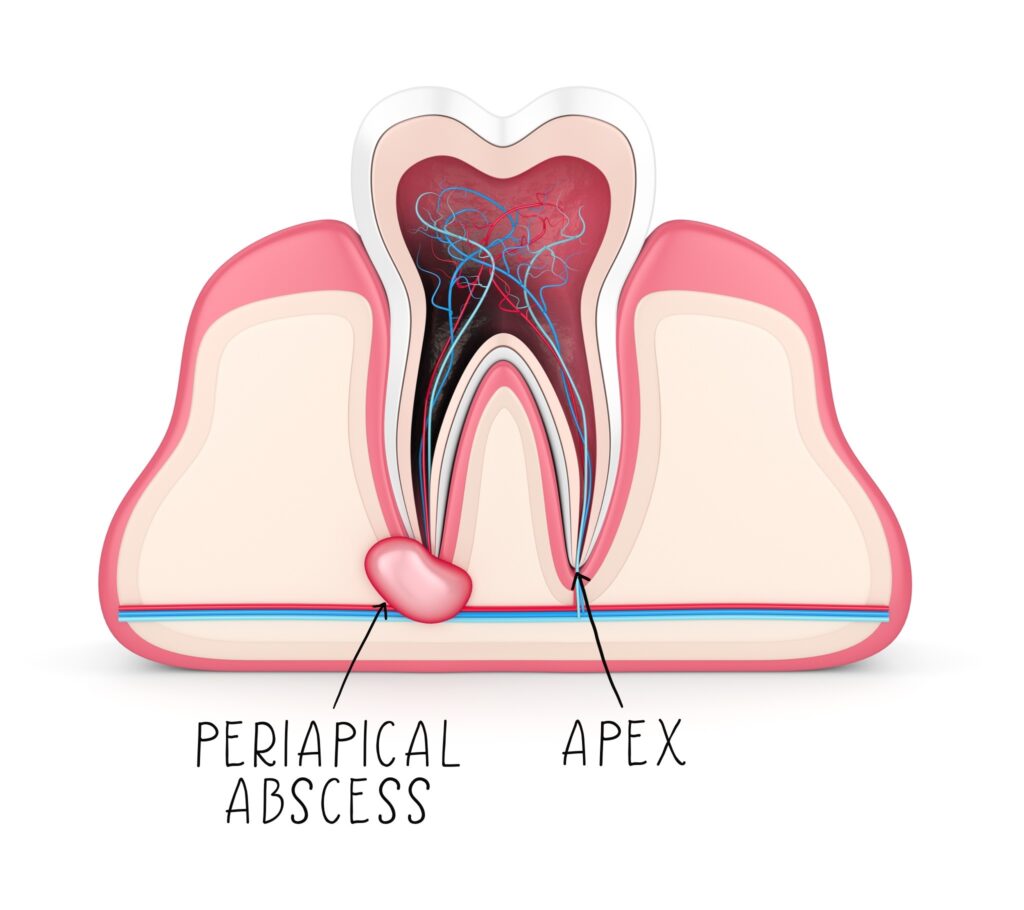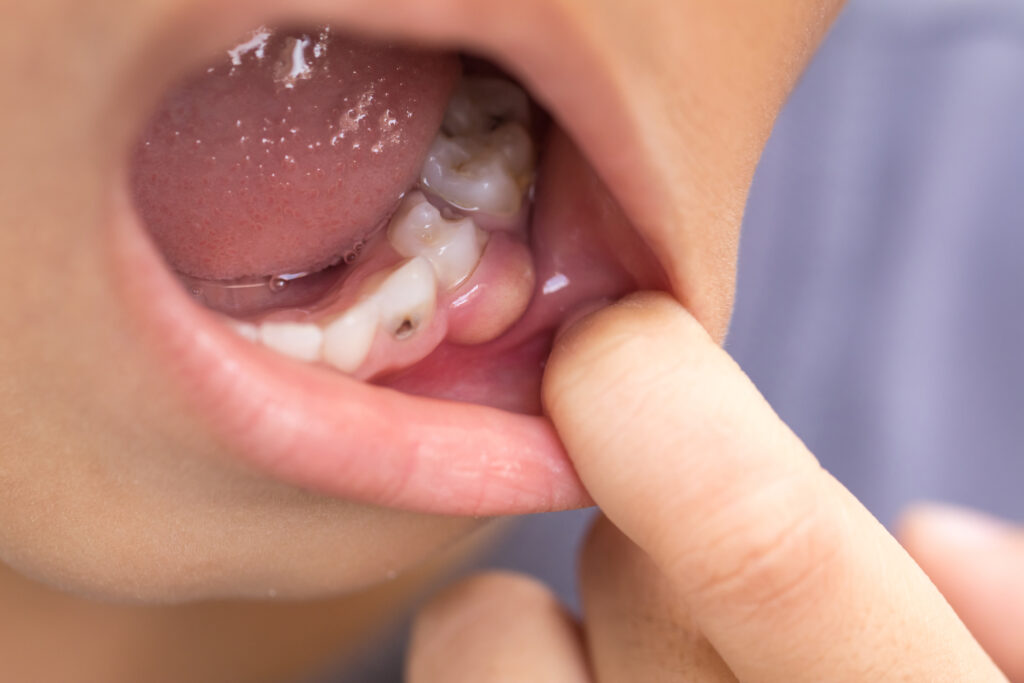What Is A Tooth Abscess & What Causes Them?

If your child is experiencing a severe toothache, you should contact your child’s dentist right away. Toothaches can be a sign of various potentially serious dental issues, including dental abscesses. In this article, we will cover the following topics related to tooth abscesses in children:
- What Is A Tooth Abscess?
- What Causes Tooth Abscesses in Children?
- Is A Tooth Abscess A Dental Emergency?
- How Do I Know if My Child Has An Abscessed Tooth?
- Will A Tooth Abscess Go Away on Its Own?
- What if Your Child’s Symptoms Begin to Improve on Their Own?
- How Do You Treat An Abscessed Tooth in A Child?
What Is A Tooth Abscess?
An abscess is a pocket of pus. Abscesses can form in many areas of the body, including around the teeth and gums. Perhaps the most common type of abscess that pediatric dentists see are periapical abscesses.
Periapical abscesses are abscesses that form around the apex of a tooth – that is, the tip of the tooth’s roots. In this article, when we refer to a “tooth abscess,” we will be referring to a periapical abscess. We will save discussions of other types of dental abscesses for another day.

What Causes Tooth Abscesses in Children?
Periapical abscesses are caused by bacterial infections in the dental pulp. A tooth is composed of three layers: (1) a hard outer layer; (2) a porous second layer; and (3) a soft, nerve-filled center known as dental pulp. When a bacterial infection causes a child’s dental pulp to become severely inflamed, the child may develop an abscess around the infected tooth’s apex.
A child’s dental pulp can become infected in a number of ways. Often, these infections are the result of untreated cavities in children. When left untreated, a cavity will eventually become so deep that it reaches the dental pulp. When this happens, bacteria can invade the dental pulp, leading to inflammation or pulpal necrosis (death of the dental pulp), and often a subsequent tooth abscess.
In some cases, dental injuries can also lead to tooth abscesses. For example, if a child’s tooth has a deep crack, bacteria may be able to enter the tooth’s dental pulp through that crack. As another example, when a child’s tooth is “pushed” during an accident, the nerve and blood vessels inside the tooth can be severed or damaged, which may lead to future infection.
Is A Tooth Abscess A Dental Emergency?
Yes. If you suspect your child may have a tooth abscess, it is important to seek care as soon as possible. Call your child’s dentist right away and inform the dentist of your child’s symptoms. If left untreated, a tooth abscess can spread to other parts of the body, potentially leading to serious medical complications. In rare cases, tooth abscesses can even lead to life-threatening conditions such as brain abscesses and Ludwig’s angina.
If your child is experiencing difficulty breathing, difficulty swallowing, swelling in the neck, severe facial swelling or other potentially life-threatening conditions, you should first seek immediate treatment from a hospital’s emergency department to help control the infection and stabilize your child.
Note that many hospitals do not have dentists on staff. If the hospital you visit does not have a dentist, your child will need to see a dentist as soon as possible after leaving the hospital to have the tooth abscess treated. (See below for more information about how pediatric dental abscesses are treated.)
How Do I Know if My Child Has An Abscessed Tooth?
The symptoms that a child with a periapical abscess will experience depend on a number of factors, including how far the bacterial infection has spread. Symptoms could include
- Severe pain in the affected tooth (and possibly in other teeth, the child’s ear, the neck, the temple and/or the eyes)
- Temperature sensitivity
- Sensitivity to pressure placed on the affected tooth
- Tooth mobility
- Color change in the affected tooth (e.g., the tooth turning black)
- Swelling and/or redness in the gums near the affected tooth
- Facial swelling
- Swollen lymph nodes under the child’s jaw or in the neck
- Fever
If you suspect your child may have a tooth abscess, you should contact your child’s dentist right away. A pediatric dentist can use dental X-rays to confirm the presence of the abscess and determine its exact location.

Will My Child’s Tooth Abscess Go Away on Its Own?
No, a tooth abscess will not heal on its own. If you suspect that your child may have a dental abscess, seek professional treatment from a dentist as soon as possible to prevent the infection from spreading and becoming a medical emergency. Never attempt to treat your child’s tooth abscess at home.
What If Your Child’s Symptoms Begin to Improve on Their Own?
Even if your child’s symptoms seem to be improving, an abscessed tooth still requires emergency dental treatment. Sometimes one or more of the symptoms of a tooth abscess will suddenly disappear, but this does not mean that the abscess is actually healing. As mentioned above, a tooth abscess will not heal without treatment.
How could the symptoms of a child’s tooth abscess disappear if the child’s condition is not actually improving? There are various ways this can happen, but let’s look at just a couple of examples:
- Say a child is experiencing sensitivity to cold drinks as a result of a tooth abscess. If the infection in the child’s dental pulp progresses so far that the pulp becomes necrotic (i.e., dies), the nerves in the dental pulp will no longer be able to send pain signals to the child’s brain. As a result, the tooth sensitivity could suddenly disappear even though the child’s condition is actually worsening rather than improving.
- As another example, a child who is experiencing intense pain due to a dental abscess may feel sudden relief if the abscess drains itself (i.e., if the pus leaks out). However, that relief will only be temporary. Until the infection is properly treated, it can continue to spread and may end up causing even more severe or widespread pain.
How Do You Treat an Abscessed Tooth in A Child?
In order to treat a periapical abscess and prevent the infection from spreading, a dentist must remove the infected tissue. Depending on the severity, this can be achieved either by a root canal or tooth extraction.
In some cases, the swelling around the child’s tooth may be so severe that these procedures cannot be performed safely. In such cases, the child may first be prescribed antibiotics to control the infection and reduce swelling so that the root canal or tooth extraction may then be performed.
Emergency Dental Treatments for Kids in Hurst, Texas
If you suspect your child may have a tooth abscess, call Hurst Pediatric Dentistry at (817) 510-6400 right away and we will make an emergency appointment to see your child as soon as possible. Hurst Pediatric Dentistry’s Dr. Lin is a board-certified pediatric dentist with significant experience treating dental abscesses in kids.
Hurst Pediatric Dentistry is located in Hurst, Texas, and proudly serves pediatric patients from Hurst, Euless, Bedford, Colleyville, Keller, Southlake, Fort Worth, and the surrounding area.
This article is intended to provide general information about oral health topics. It should not be used to diagnose or treat any disease or as a substitute for the advice of a healthcare professional who is fully aware of and familiar with the specifics of your case. Always seek the advice of your dentist or other qualified healthcare provider with any questions you may have regarding a medical condition or treatment.
MEDICALLY REVIEWED BY:
Dr. Jin Lin

Dr. Jin Lin is a board-certified pediatric dentist with a passion for helping children achieve healthier, more beautiful smiles. He earned his Bachelor of Science degree from Cornell University and his Doctor of Dental Medicine (D.M.D.) degree from the Harvard School of Dental Medicine. After graduating cum laude from dental school, he completed his post-doctoral pediatric dentistry training at Boston Children’s Hospital and the Harvard School of Dental Medicine, where he served as chief resident and worked with children with a wide variety of special medical and dental needs, including children with rare syndromes.

